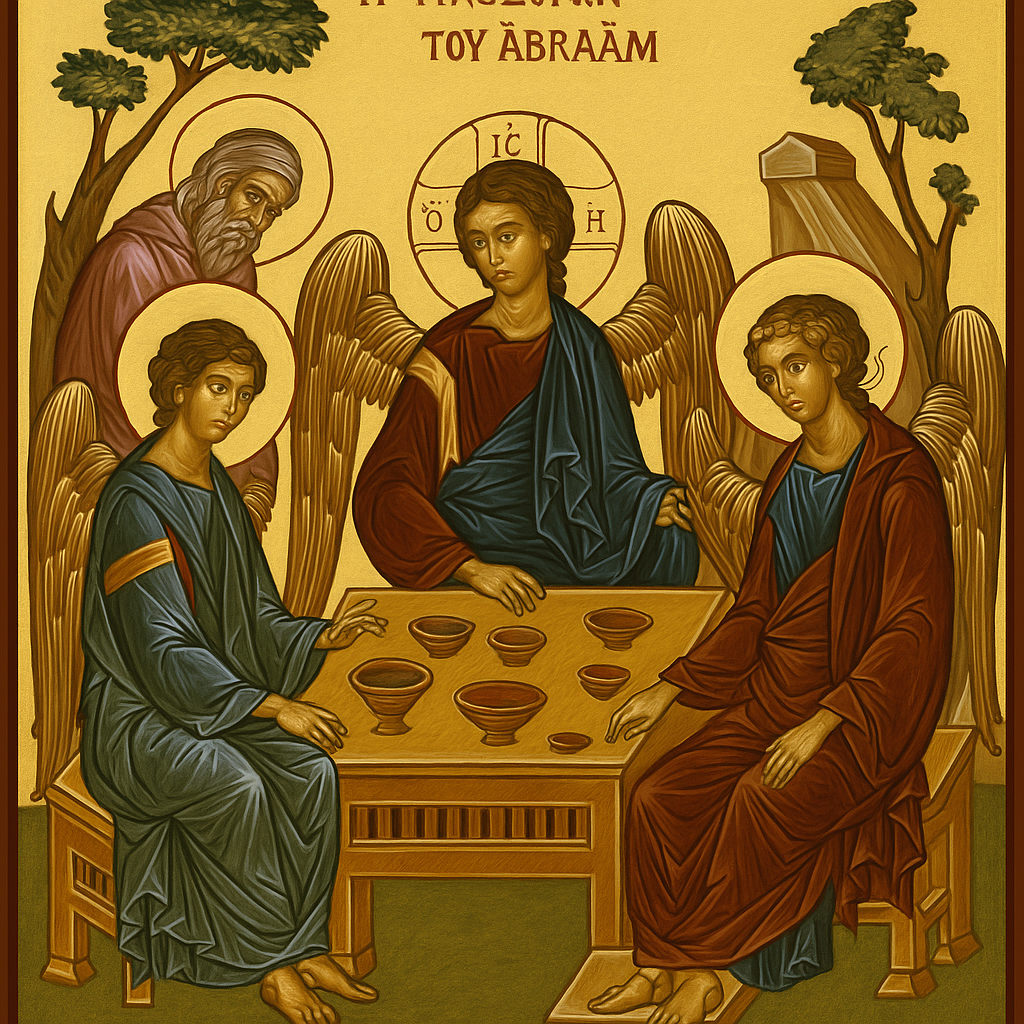Children of Abraham by Faith, Not by Name – Week 4 – Holy Fifty Days 2025
Gospel Reading: John 8: 30–42 (NKJV)
“They answered and said to Him, ‘Abraham is our father.’ Jesus said to them, ‘If you were Abraham’s children, you would do the works of Abraham.’” (John 8:39)
In the Name of the Father, and the Son, and the Holy Spirit, One God. Amen.
May the blessing of the Father who calls us and His Only Begotten Son Jesus Christ who saves us, and the Holy Spirit who sanctifies and transforms us be with us all, that we may hear His word and bear fruit—thirty, sixty, and a hundredfold. Amen.
Beloved, today we stand before a powerful encounter in the Gospel of John, chapter 8. The Jews say to the Lord Jesus:
“Abraham is our father.”
But the Lord answers,
“If you were Abraham’s children, you would do the works of Abraham.” (John 8:39, NKJV)
This statement cuts through generations of religious pride and self-assurance. Because to be Abraham’s child is not just to bear his name, but to imitate his faith, his obedience, and his walk with God.
I. Abraham: The Father of Faith
Abraham’s name is mentioned eleven times in this single chapter of John’s Gospel. That tells us this is no light subject. And it reminds us how deeply the Jewish people cherished their connection to him.
God promised Abraham:
“I will make you a great nation… in you all the families of the earth shall be blessed.” (Genesis 12:2–3)
They believed this promise gave them automatic status. But Christ came to challenge a false sense of security based on heritage rather than heart.
Yes, Abraham received great promises—but these were always tied to obedience. God said to him:
“Walk before Me and be blameless.” (Genesis 17:1)
So even in the Old Testament, sonship was never about blood alone—it was about faith that obeys.
II. The Danger of Empty Inheritance
By the time of Christ, many had twisted this truth. They said, “We are Abraham’s descendants. We are already saved.”
But listen to what St. John the Baptist said to them:
“Do not say to yourselves, ‘We have Abraham as our father.’ For I say to you that God is able to raise up children to Abraham from these stones.” (Matthew 3:9)
The Lord Jesus pushes this even further. He tells them plainly:
“You are Abraham’s descendants, but you seek to kill Me… Abraham did not do this.” (John 8:37, 40)
Why? Because Abraham welcomed the Word of God. He obeyed when God called. He believed even when it seemed impossible. But those standing before Christ refused the very Truth they claimed to serve.
St. Augustine comments here and says:
“They were born of Abraham, but had become degenerate. They had the blood of Abraham, but not his faith.”
III. What Makes Someone a True Child of Abraham?
The answer is clear in Scripture:
“Those who are of faith are sons of Abraham.” (Galatians 3:7)
St. Paul says that Abraham believed God, and it was accounted to him for righteousness. (Romans 4:3) He trusted God, even when he didn’t understand. That is the true sign of sonship.
That’s why the Lord told Zacchaeus:
“Today salvation has come to this house, because he also is a son of Abraham.” (Luke 19:9)
Not because Zacchaeus had Abraham’s DNA, but because he had Abraham’s heart—a heart that repented, gave to the poor, and walked in truth.
So today, the question is not “Are you from Abraham’s lineage?”
The question is: “Are you doing the works of Abraham?”
IV. Practical Reflection: Do I Live as a Child of Abraham?
My beloved brothers and sisters, this Gospel calls us to an examination of our own spiritual inheritance.
Do we carry Abraham’s obedience—or just his name?
Do we walk before God with sincerity—or are we content with outward appearances?
Abraham left his homeland. Are we willing to leave our comfort zone for the sake of Christ?
Abraham trusted in God’s promise. Do we still trust when God is silent?
Abraham obeyed even when God’s will was hard. Do we submit, or do we argue with God?
As Coptic Christians, we proudly say, “We are children of the Apostles, of the martyrs, of the saints.” But the Lord Jesus speaks to us as He spoke to them:
“If you were their children, you would do their works.”
Let us not hide behind a glorious past if we do not live its spirit.
Closing Practice and Blessing
Today, take one step of faith like Abraham.
Obey one command of the Lord—fully and with trust.
Pray, “Lord, I do not want to inherit just a name, but a life of faith.”
Let us come to the Eucharist with reverence, not as a ritual, but as an act of obedience—believing, like Abraham, that God fulfills what He promises.
May we walk in the footsteps of Abraham. May we hear His voice and follow it. May our hearts be children of faith, not just words.
May the Lord bless us, transform our hearts and minds, that our homes may stand on the Rock, our hands serve in the harvest, and our hearts long for Heaven. Amen.
Practical Application
This week:
- Read Genesis 12–22 and reflect on Abraham’s steps of faith.
- Choose one area in your life where obedience is difficult—and surrender it in prayer.
- Arrive early to Liturgy to hear and obey His word before partaking in His Body and Blood.

